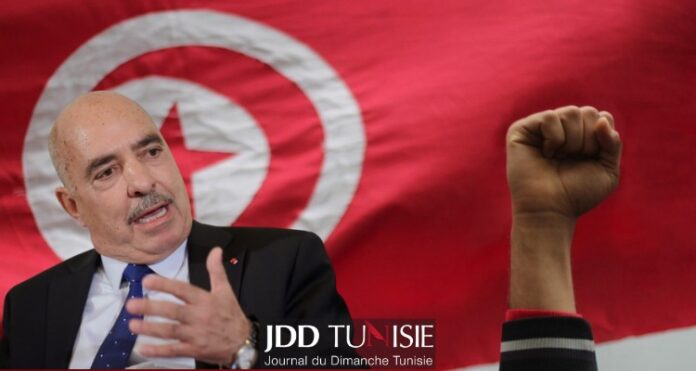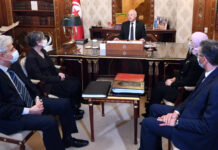By Abdul-Sattar Ben Moussa
The economic and social transition requires reviewing the mode of development, reforming the banking system, national companies, and governing agricultural activity.
A Sick Pattern of Development and the Need for an Alternative.
The Current Development Pattern does not Provide for Development.
Civil society in our country continues to resist the manifestations of tyranny and struggle for freedom, democracy, equality and social justice. The stages and methods of the struggle varied, from intellectual forums to marches, sit-ins, and demonstrations. As a result, its militants suffered from arrests and show trials.
Civil society became involved in the revolutionary movement that led to the overthrow of the former regime on 14 January 2011 and, since 2013, demonstrated its ability to contribute effectively to the democratic transition in the political sphere by organizing a national dialogue and proposing a roadmap agreed upon by the parties involved in the dialogue and accomplished through high-level dialogues and militant movements. So a new consensual constitution was ratified on 26 January 2014, which guarantees rights and freedoms and establishes a democracy that breaks with the “durability of the chairs” through power rotation which is achieved by periodic democratic and transparent elections.
While civil society has continued to put pressure on political parties and forces to actively maintain the democratic transition path and to avoid many setbacks and bumps, political mobility has witnessed several slips and abuses that have almost completely hit the transition path. In parallel with the political dialogue, civil society has not sought to organize a national dialogue on economic and social conditions and on the way to development. The democratic transition in the political sphere remains threatened if it is not supported by economic and social transition.
In countries whose economies remained in decline during the transitional period and did not witness a positive economic and social transformation like the former Soviet republics, the political transition became threatened with failure.
The global capitalist system seeks to impose its control through neoliberal economic policy on the largest number of countries in the world to make them consumer markets for its products and commodities.
During the first years since 1956, the modern political elites ruling in the country did not succeed in formulating an economic approach consistent with the needs of the society exhausted by the colonial period. The scale since 1956 has tended to be an ill-considered liberal tendency that was unable to put an end to the state of collapse and structural disintegration that followed the exit of the French occupiers from Tunisia. As a result of this faltering situation, the economy ministers were changed 4 times between 1956 and 1959. Then came the stage of agricultural and commercial cooperation and the nationalization of agricultural properties (1964-1969), which was an improvised, forced and unorganized economic choice. The cooperative experiment was a form of state capitalism that was dominated by the administrative bureaucracy and the structures of the ruling party, although it aimed at generalizing the lands, overcoming their dispersal, strengthening agricultural production, controlling it, and developing its profitability. However, the experiment failed and has not been evaluated since the 1970s. Tunisia has returned to adopting the liberal development model. Nevertheless, the economic policy remains aimed at resisting unemployment and making growth primarily dependent on domestic demand and considering employment and wages among the most important components of that internal demand.
Since 1986, and in the framework of implementing the structural reform program in accordance with the dictates of the World Bank, the International Monetary Fund and the rest of the international financial institutions, the development pattern has shifted to the stage of a market economy that depends more on exports, that is, on external demand, and neglected internal demand, so the neoliberal developmental pattern has become blown by the fluctuations of global markets. Whenever a crisis of neoliberal globalization occurs, it has a negative impact on the national economy, especially in light of the fierce competition with the European Union, which expanded geographically and developed economically and became the main partner of the Tunisian countries suffering from economic stagnation.
As a result of the quest to resist inflation rather than resistance to unemployment, in accordance with the instructions of the international financial circles, fragile work contracts such as handling and occasional or seasonal work have proliferated, and the Labor Code was revised in this direction in 1994 and 1996, and international relations became subject to the principle of reciprocity. The differential agreements that were used by developing countries to support their economies were abandoned due to the unequal relations between the countries of the North and the South.
As a result of this, the economic fabric witnessed a great upheaval. The value-added ratio of the services sector to the GDP increased, while the added value of the manufacturing industries and others decreased. Because of this, the proportion of investment in the private sector decreased compared to the end of the seventies, despite government encouragements and numerous tax concessions. The parallel economy has surpassed the organized economy in its activities and transactions.
Although the financial balances improved, the balance sheet deficit shrank, the debt ratio decreased, the inflation rate decreased, the debt ratio decreased, and the volume of foreign investments increased during the period between 1990 and 2010, the growth rate remained slow and in most cases did not exceed 5 percent according to official statistics that are usually inflated. This percentage did not create wealth and did not reduce the unemployment rate, nor did it reduce social and class differences. Foreign investments went to the field of producing goods intended for export, and settled mainly in the coastal strip due to its proximity to sea ports.
The share of the investments made by the internal regions, especially the western strip, was very little. All of this led to a decline in the state’s role in the production and distribution of wealth, which deepened social disparities and increased poverty and unemployment.
The share of internal regions and especially the western strip of investments has been very little. All this has led to a decline in the role of the State in the production and distribution of wealth, which has deepened social disparities and increased poverty and unemployment.
Our country has chosen to proceed in the neoliberal developmental path and has been keen on global integration at the expense of national and regional integration, whether African or Arab. Economic investments and trade exchanges between Tunisia and its Arab-African surroundings have remained very little if not non-existent.
Within the framework of the international division of labor, the total integration into the global economy, especially the European one, has led to limiting the Tunisian economy to the exploitation of natural resources such as phosphates and petroleum, in the tourism field, or in the manufacturing industries such as food, sewing and shoe manufacturing industries that employ a non-specialized workforce with cheap wages and within fragile labor relations such as handling.
State expenditures have declined in education, health and social services. Since the end of the nineties, the education sector has witnessed a decline in its value, especially because of the calculation of 25 percent of the annual average in the results of the baccalaureate, which led to an increase in the number of those who passed the baccalaureate exam as well as unemployed graduates. The economic fabric has become and is still unable to absorb even such competencies as doctors, engineers and technicians.
It is clearly evident that the current pattern followed has proven its limitations in achieving development in the country. Nevertheless, it has continued to work since 2011, and its negative effects have increased, represented by the deterioration of services, the decline in social protection, the rise in unemployment, and the exacerbation of the financial deficit of social funds and national companies, such as the Tunis Air Company or the Railways Company.
The value of the national currency fell to its lowest level compared to foreign currencies, especially the Euro, the currency of the European Union, the most important economic partner of our country, which led to the rise in prices and the collapse of the purchasing power.
The tourism sector has collapsed as a result of the wave of violence and assassinations that have occurred since 2012, especially after the terrorist attacks that took place in touristic places in 2015 and 2016. In addition, the deteriorating security situation in Libya led to the loss of the Libyan market. The production of phosphate and oil has also declined due to poor governance within state partnerships such as the Gafsa Phosphate Company and the chemical complex.
Phosphate production decreased by 52 percent between 2010 and 2016, according to official statistics, while the oil sector recorded a 47 percent decline during the same period. The production of large companies, especially in the chemical field, also declined by 30 percent, and the deterioration of the infrastructure of ports, airports and roads greatly reduced the production of the private sector.
Our country has become spending huge sums of money in hard currency to import basic foodstuffs, especially grains. During the first three months of 2021, grain imports recorded a barrier of 500 million dinars, according to official data issued by agricultural circles. It is clear from the reports of the World Bank and the International Monetary Fund that between 2011 and 2018, public spending increased significantly from 24 percent to 30 percent of GDP, while tax revenues increased by a smaller percentage during the same period, from 23 percent to 25 percent. The spending was also in favor of consumption, as the mass of public employees’ wages rose from 11 to 15 percent between 2010 and 2018. This resulted in a worsening of the deficit in the public sector, which exceeded 5 percent of GDP each year during the period from 2015 to 2018, which led to a decrease in domestic investments and an inflated public debt, which rose by 40 percent of GDP in 2010 to 73 percent. In the year 2019, and if we add to this the annual losses incurred by national companies and the worsening deficit in the pension system, the public debt ratio will rise to 150 percent of GDP.
The significant deterioration in the balance of payments has led to an increase in the external debt from 40 percent of GDP in 2010 to 85 percent in 2019. In the future, a significant proportion of loans, if any, will be allocated to repaying interest on loans that are due to be paid. The developmental pattern has caused Tunisia’s developmental classification to decline 8 times since 2011, which will make it difficult for the country to even borrow and make it threatened with the specter of bankruptcy if the current development pattern is not reviewed and a new development model is well thought out, creating wealth, achieving development and ensuring social justice.











